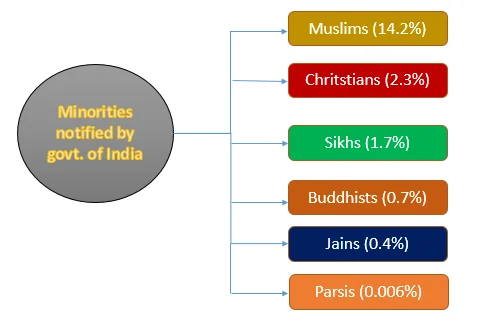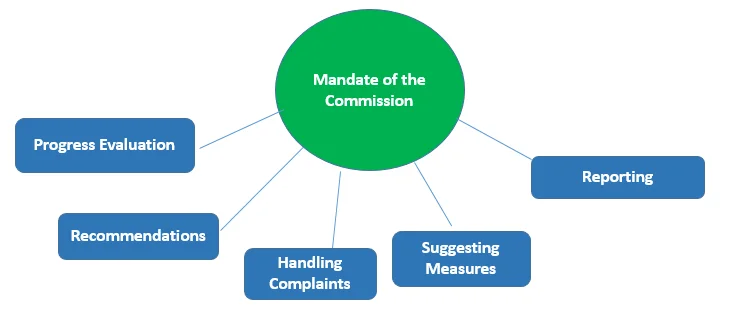In India, the term “minority” is not explicitly defined in the Constitution. However, the need for a commission to address the concerns of minority communities in India was felt for a long time, as India is a diverse country with a multitude of religious and linguistic groups. The Commission was established to protect and promote the rights of these minority communities.
National Commission for Minorities
Establishment of the Commission
National Commission for Minorities Act (1992) was set up through the following steps:
- Executive Resolution (1978): In 1978, the Government of India established the Minorities Commission through an executive resolution.
- The resolution was motivated by the persistent sense of inequality and discrimination experienced by minority communities in India despite constitutional safeguards.
- Enactment of the National Commission for Minorities Act (1992): To provide a legal framework for the Commission’s operations and to grant it statutory status, the National Commission for Minorities Act was enacted in 1992.
- This transition led to the renaming of the Commission as the National Commission for Minorities.
- Autonomous Body Under Ministry of Minority Affairs: The National Commission for Minorities operates as an autonomous body under the administrative control of the Ministry of Minority Affairs, Government of India.
Enroll now for UPSC Online Course
Definition of ‘Minority’
- Lack of Specific Definition in the Act: The Act itself does not provide a specific definition of the term ‘minority.’
- Authority of the Central Government: Instead, it grants the Central Government the authority to notify communities as minorities for the purposes of the Act.
- Recognition of Minority Communities in 1993: In 1993, five religious communities were officially recognized as minority communities: Muslims, Christians, Sikhs, Buddhists, and Zoroastrians (Parsis).
- Addition of the Jain Community in 2014: In 2014, the Jain community was added to this list.
| Neither the Constitution nor the National Commission for Minorities Act defines the term ‘minority’. |
Religious minorities recognised under the NCM Act:

Constitutional Recognition of Minorities in India
|
Appointment and Service Conditions of Members
- Composition: The Commission is a multi-member body comprised of a Chairperson, a Vice-Chairperson, and five members.
- These individuals are nominated by the Central Government and must possess qualities of eminence, ability, and integrity.
- Five members, including the Chairperson, must be selected from minority communities only.
- Service Conditions: The Central Government (Ministry of Minority Affairs) prescribes the salaries, allowances, and other service conditions for the Chairman and members.
- Tenure and Resignation: The Chairperson and members hold their positions for a three-year term.
- They have the option to resign from their office by submitting a resignation to the Central Government.
- Removal from Office: The Central Government has the authority to remove the Chairperson or a member from office before the term expires under the following circumstances:
- Insolvency: If they become an undischarged insolvent.
- Criminal Conviction: If they are convicted and sentenced to imprisonment for an offense which is deemed to involve moral turpitude by the Central Government.
- Unsound Mind: If a competent court declares them of unsound mind.
- Inability to Act: If they refuse to act or become incapable of performing their duties.
- Absence: If they are absent from three consecutive Commission meetings.
- Abuse of Official Position: If their actions, in the opinion of the Central Government, constitute an abuse of their official position and are detrimental to the interests of minorities or the public interest.
Mandate of the Commission
The Commission is entrusted with a comprehensive nine-point mandate in the National Commission for Minorities Act, 1992, which outlines its responsibilities and functions:

- Progress Evaluation: To assess the progress of the development of minorities under the Union and States.
- Safeguard Monitoring: To oversee the effectiveness of safeguards for minorities as enshrined in the Constitution and laws passed by the Parliament and State legislatures.
- Recommendations: To make recommendations for the efficient implementation of safeguards aimed at protecting minority interests directed towards both the Central Government and State Governments.
- Handling Complaints: To investigate specific complaints about the deprivation of rights and safeguards for minorities and take appropriate action by liaising with relevant authorities.
- Conducting Studies: To initiate studies addressing issues arising from discrimination against minority communities and propose measures for their mitigation.
- Research and Analysis: To conduct research, analysis, and studies on matters related to the socio-economic and educational development of minority groups.
- Suggesting Measures: To suggest suitable measures to be undertaken by the Central Government or State Governments for the benefit of minorities.
- Reporting: To submit regular or special reports to the Central Government on all matters concerning minority communities, with a particular focus on the challenges they face.
- Handling Referrals: To examine and address any other matters referred to it by the Central Government.
- The NCM Act also states that the Central Government may notify other communities as minorities if they meet the following criteria:
- The community must be a religious or linguistic minority.
- The community must be socially, economically, and educationally backward.
- The community must be numerically insignificant in the relevant state or union territory.
Powers of the Commission
The Commission, while evaluating, monitoring, or inquiring into any matter or complaint, possesses the powers of a civil court.
These powers are particularly related to the following matters:
- Summons and Attendance: The Commission can summon and compel the presence of any individual from any part of India.
- It has the authority to examine the summoned person under oath.
- Document Production: The Commission can demand the discovery and presentation of any relevant document.
- Evidence on Affidavits: The Commission can accept and consider evidence provided in the form of affidavits.
- Public Record Access: The Commission is empowered to requisition any public record from courts or government offices.
- Witness and Document Summons: The Commission is entitled to issue summonses for the examination of witnesses and the production of pertinent documents.
- Any additional matters that can be specified by the Central Government.
Commission Reporting
- Annual Report Submission: The Commission annually presents a report to the Central Government.
- The Commission has the flexibility to submit reports as it deems necessary, aside from the regular annual report.
- Presentation to Parliament: Central Government’s Responsibility: The Central Government presents all such reports to both the Houses of Parliament.
- Explanation of Action Taken: These reports are accompanied by a memorandum that elucidates the actions taken regarding the recommendations made by the Commission.
- Furthermore, the memorandum must contain the reasons behind any non-acceptance of specific recommendations.
- Involvement of State Governments:
- Incorporating State Concerns: If a report pertains to a matter that concerns a State Government, the Commission forwards a copy of the report to the respective State Government.
- State Legislative Presentation: The State Government is obligated to present this report before the state legislature.
- Alongside the report, a memorandum detailing the actions taken concerning the Commission’s recommendations must be included.
- The memorandum should also clarify the reasons for any non-acceptance of particular recommendations.
Enroll now for UPSC Online Course
| Must Read | |
| Current Affairs | Editorial Analysis |
| Upsc Notes | Upsc Blogs |
| NCERT Notes | Free Main Answer Writing |
Conclusion
The NCM plays a crucial role in safeguarding the rights of minority communities in India. By monitoring the implementation of constitutional and legal safeguards, addressing complaints, and conducting research, the Commission works to ensure equality and justice for minorities.
- Its powers and functions, as outlined in the NCM Act, enable it to effectively advocate for minority interests and contribute to their socio-economic and educational development.
- Through its reports and recommendations, the NCM continues to strive for an inclusive and equitable society.
Sign up for the PWOnlyIAS Online Course by Physics Wallah and start your journey to IAS success today!

 GS Foundation
GS Foundation Optional Course
Optional Course Combo Courses
Combo Courses Degree Program
Degree Program









